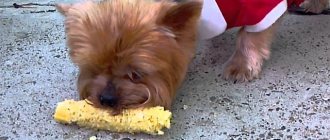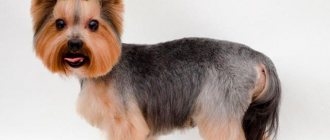Yorkshire Terriers are the most popular decorative dog. One of the reasons for interest in the breed is its hypoallergenicity. Many dog breeders believe that there is no allergy to the Yorkshire Terrier, since it does not have undercoat or shedding in the usual sense, when fluff flies all over the apartment. However, the opinion that Yorkies are not allergic to humans turned out to be only partially true. It is not just the fur that causes the painful reaction, but also the protein present in the saliva, feces and epithelium of dogs. Yorkie owners should know how allergies manifest themselves and how to diagnose and treat the pathology.
Are there allergies to Yorkies?
Despite the fact that the Yorkshire Terrier is called a hypoallergenic dog, the prefix “hypo” does not exclude the development of pathology, but only indicates a reduced risk of the disease. Erka wool is not high on the list of possible allergens. It carries secretions (saliva, fluids from glands, dandruff, tears, feces). The proteins that make up them are the most dangerous for allergy sufferers. When Yorkies are frequently washed and groomed, and the house is regularly wet-cleaned, the risk of a painful reaction from the body is reduced. The difficulty in determining pathology is that for some, a single contact with a dog is enough for it to manifest itself, while for others, the disease is detected after accumulation.
Could it not appear immediately?
An allergic reaction does not always appear immediately. This kind of allergy is called accumulative, when the allergen accumulates in the blood, and then after a certain time begins to manifest itself in various allergic reactions.
This kind of allergy is most unpleasant, since household members have time to get used to the small dog and it will be much more difficult to part with him.
But there is also a temporary allergy, when the first time after the dog appears in the house, one of the family members develops allergic symptoms.
Over time, after the body adapts, these symptoms disappear.
Why are there allergies to Yorkshire terriers?
The process of developing an allergy is quite simple. Yorchik, who lives in an apartment, constantly licks himself, leaves marks on furniture, itches and goes to the toilet. Proteins from physiological fluids enter the human body, where the immune system comes to protect against foreign bodies. If its operation fails, a pathological reaction follows.
To check for an allergy to the fur of a particular Yorshik, you should spend some time with the puppy in the kennel. If the pathology does not manifest itself in any way, they buy a dog. It has been noted that Yorkie boys are more dangerous for allergy sufferers. The reason is their high levels of hormones. Castration of the Yorkshire Terrier helps reduce the danger if there are no plans to use the pet in breeding work.
Hypoallergenic shampoos
To neutralize the effects of proteins secreted by the animal’s body, you can use anti-allergenic shampoos, which are available in specialized stores.
These shampoos also contain substances that prevent dry skin of terriers and fight parasites such as fleas and ticks.
If you choose the right product, you can ensure that the protein does not spread to the animal’s fur.
Are Yorkies suitable for allergy sufferers?
Most often, for allergy sufferers, the thin, human-like hairs of the Yorkshire Terrier are not dangerous. To determine whether there is an allergy to it, you need to conduct a test - limit communication with the dog for a month. At this time, the apartment is cleaned and disinfected. If the symptoms first disappeared, and then reappeared after new contacts with the pet, then the pet is the source of the pathology.
When an exacerbation occurs in the autumn or spring, the reason may lie in the pollen brought by the Yorkie after a walk.
Preparing for the test
In order for the result of immunoblotting to be as reliable as possible, you need to follow several rules for preparing for the analysis:
- Blood is donated during the period of remission. If you conduct an analysis during an exacerbation of allergies, it will be difficult to determine which allergen caused the disease due to the high level of total IgE, which will distort the results.
- The analysis is not performed in patients with viral or bacterial infections. It is also worth postponing the test in case of exacerbation of chronic diseases or poisoning.
- 3-5 days before the test you need to stop taking medications and antihistamines. If your health condition does not allow you to stop treatment, consult an allergist.
- A few days before the test, you need to exclude contact with pets.
- A week before the test, it is necessary to exclude the most allergenic foods from the diet (honey, chocolate, nuts, citrus fruits, red fruits and berries, foods with preservatives and dyes, carbonated drinks).
- The day before the test, you should avoid strenuous physical activity, drinking alcohol, and smoking.
- You need to donate blood on an empty stomach, with your last meal at least 10 hours before taking blood.
Compliance with these rules allows you to conduct an allergy test with maximum accuracy and avoid false positive results. Your medical
Go to services and prices >>
Allergies in a child
Due to the vulnerability of the immune system, allergies are most dangerous for children. It is quite difficult to diagnose it in the early stages. In order to prevent serious consequences, you should find out whether the Yorkshire Terrier that was brought into the house is allergenic for the child. To do this, reactions are carefully monitored.
Concerns should be raised by:
- unmotivated tearfulness of children;
- labored breathing;
- coughing;
- vomiting, diarrhea;
- redness of the whites of the eyes;
- lacrimation;
- rash.
The child's skin may turn red even at the point of contact with the Yorkshire Terrier. In severe cases, Quincke's edema and anaphylactic shock develop.
Diagnostics
After a thorough examination of the patient and collection of anamnesis, the doctor in most cases will prescribe additional research methods, namely: blood test, urine test, blood biochemistry, immunogram and special skin tests.
How is a skin test performed? A small amount of purified extracts of various allergens is applied to the skin in the forearm area. At the site where the solution is applied, a puncture is made with a needle or an incision with a scarifier. The test results are assessed after 15 minutes. The most common side effects of the test include itching and redness of the skin, which go away on their own within an hour.
We will talk further about how to determine if a child is allergic to a dog and what parents should do as first aid.
Symptoms of an allergic reaction
If the Yorkshire Terrier is allergic to a person, symptoms will certainly appear. Typically, children have a special reaction, it is much stronger than in adults, since the child’s immunity is less resistant to irritants.
The main symptoms of an allergic reaction to a Yorkie include:
- skin itching;
- hives;
- nasal congestion, runny nose;
- redness of the eyeballs;
- profuse lacrimation;
- swelling;
- difficulty breathing.
Symptoms do not appear immediately after contact with a Yorkie. This is because animals produce small amounts of allergens.
Treatment
Doctors use the following medications to treat allergic conditions:
- antihistamines;
- enterosorbents;
- corticosteroids;
- decongestants.
Antihistamines: Tavegil, Claritin, Diphenhydramine.
Corticosteroids are especially effective for allergic symptoms, however, they are not safe. The drugs have a number of side effects and can only be prescribed by a specialist who will tell you how allergies to cats manifest in children and how to help your child at home.
How to get rid of allergies?
The manifestation of an allergy to a Yorkie is no different from the reaction to other types of allergens. It is difficult to treat the pathology; there is no universal remedy, but there are several methods that can eliminate acute symptoms and normalize the general condition of the patient.
ethnoscience
In folk medicine, there are several recipes, the use of which allows you to combat allergies to the Yorkshire Terrier:
- Sequence - tea from the plant is taken orally, napkins soaked in the decoction are applied to problem areas of the skin.
- Onion, black elderberry, plantain - take an alcohol tincture orally, which is diluted in a ratio of 20 drops per 200 ml of water.
- Olive oil – use in the diet helps inhibit the release of histamine.
- Birch leaves - take tea.
It is worth considering that before you start taking any of the Yorkshire allergy remedies, you should consult your doctor.
Drug therapy
Depending on the severity of the allergic reaction to the Yorkshire Terrier, drug treatment varies:
- At the first symptoms (itching, redness), antihistamines are used.
- For heavy discharge and nasal congestion, use nasal sprays and drops.
- For edema - decongestants.
- When detoxifying the body - adsorbents.
- To strengthen the immune system - courses of vitamins.
In the most severe cases of Yorkie allergies, hormonal medications are used in the form of injections or injections. They are selected individually by the doctor depending on the patient’s condition.
Immune-specific treatment
The condition of those who suffer from an allergic reaction to erka can be alleviated with the help of immunotherapy. Its essence is that the allergen is introduced into the body in gradually increasing doses. As a result, the Yorkshire Terrier's sensitivity to the protein decreases and the disease recedes for several years.
Immunospecific therapy is carried out using two methods:
- injection - the allergenic irritant is injected subcutaneously;
- non-injection – take medications with an allergenic substance in the form of tablets, drops, capsules and powders.
The course of treatment for Yorkshire Terrier allergies depends on the severity of the disease and lasts from 14 days to a year. The doctor selects the dose, since small ones do not give the desired effect, and high ones cause an increase in allergies.
Methods for identifying an allergen product
Finding an allergen is extremely difficult; the moment when a reaction to giving food appears immediately is considered a miracle. The breeder must understand that the search lasts for a period of 3-4 weeks or longer.
Memo to the owner:
- You cannot trust a doctor who gives a conclusion “food allergy” just by looking at your pet.
- You cannot refuse diagnostics, it is long and expensive, but without this it is almost impossible to find the cause of the disease.
- The main stage of treatment and the administration of medications from the main list occurs only after laboratory tests. Before this, they are limited to symptomatic drugs.
Treatment of food allergies is a “gold mine” for veterinarians who are unscrupulous about their work. Tons of medications and procedures prescribed without identifying the cause of the allergy greatly affect the health of the animal.
The best condition for obtaining lasting results is experimentation. It is aimed at the consistent elimination of feeds that are likely allergens.
Its complexity lies in the notorious “accumulation effect”; even with the complete exclusion of provoking factors, the residual effect of allergens remains. Against this background, an incorrect concept is formed about the advisability of discontinuing this particular food, so a strict diet is followed for 3 weeks.
The diet starts with a rice + lamb complex, it is maintained for 3-4 weeks, then the products are shuffled. Replace lamb with rabbit meat, rice with buckwheat, and pearl barley. Each ingredient is tested for at least 2-3 weeks. An elimination diet is often used.
Sometimes a breeder takes a less complicated route and buys anti-allergenic dog food. In the ranking of the best: Pro-Plan, Hills, anallergenic Royal Canin, Ekanuba. Holistic dog food performs well; it contains a higher content of nutrients. Antiallergic food of this class is included in the diet immediately; their use does not require special preparation. A dog with allergies will have to be fed a special diet for life.
What complications can arise from allergies?
Immediately after it becomes clear that the Yorkshire Terrier is allergic, treatment begins. Late initiation of therapy is dangerous because the disease becomes chronic. So, for those who suffer from bronchial asthma, suffocation is possible, rhinitis turns into purulent inflammation and conjunctivitis. Skin rashes are complicated by the appearance of eczema and atopic dermatitis.
The most severe complication of an allergic reaction to Yorshik is anaphylactic shock, which is a real threat to human life.
Pet care and room cleaning
In the apartment where the Yorkshire Terrier lives, it is necessary to regularly clean, ventilate and disinfect. It is necessary to remove hairs and pieces of epidermis that have fallen from Eric's fur.
During cleaning, adhere to several rules:
- Use a fine vacuum cleaner.
- Winter clothes are stored in covers.
- Carpets, soft toys and bedspreads are removed.
- Treat with special sprays the places where the Yorkie is most often found.
- Deny the pet access to the bedroom and other rooms.
Despite the fact that the Mini Yorkshire Terrier is considered a hypoallergenic breed, hygiene procedures help reduce the risk of allergies to a minimum. To do this you need:
- Brush Erica daily.
- Treat against external and internal parasites.
- Bath once a week.
- Trim the coat regularly.
Preventing an allergic reaction to wool
With the help of preventive measures, it is possible, if not to prevent the development of negative reactions to the Yorkshire Terrier, then at least to reduce their intensity. For this purpose, they wet clean the room twice a week, use an antibacterial air purifier, use hypoallergenic cosmetics for the Yorkie, monitor its health and feed it properly.
The dog owner and all family members should wash their hands after contact with the Yorkshire Terrier, wash and shower as often as possible to cleanse the skin of allergens.











